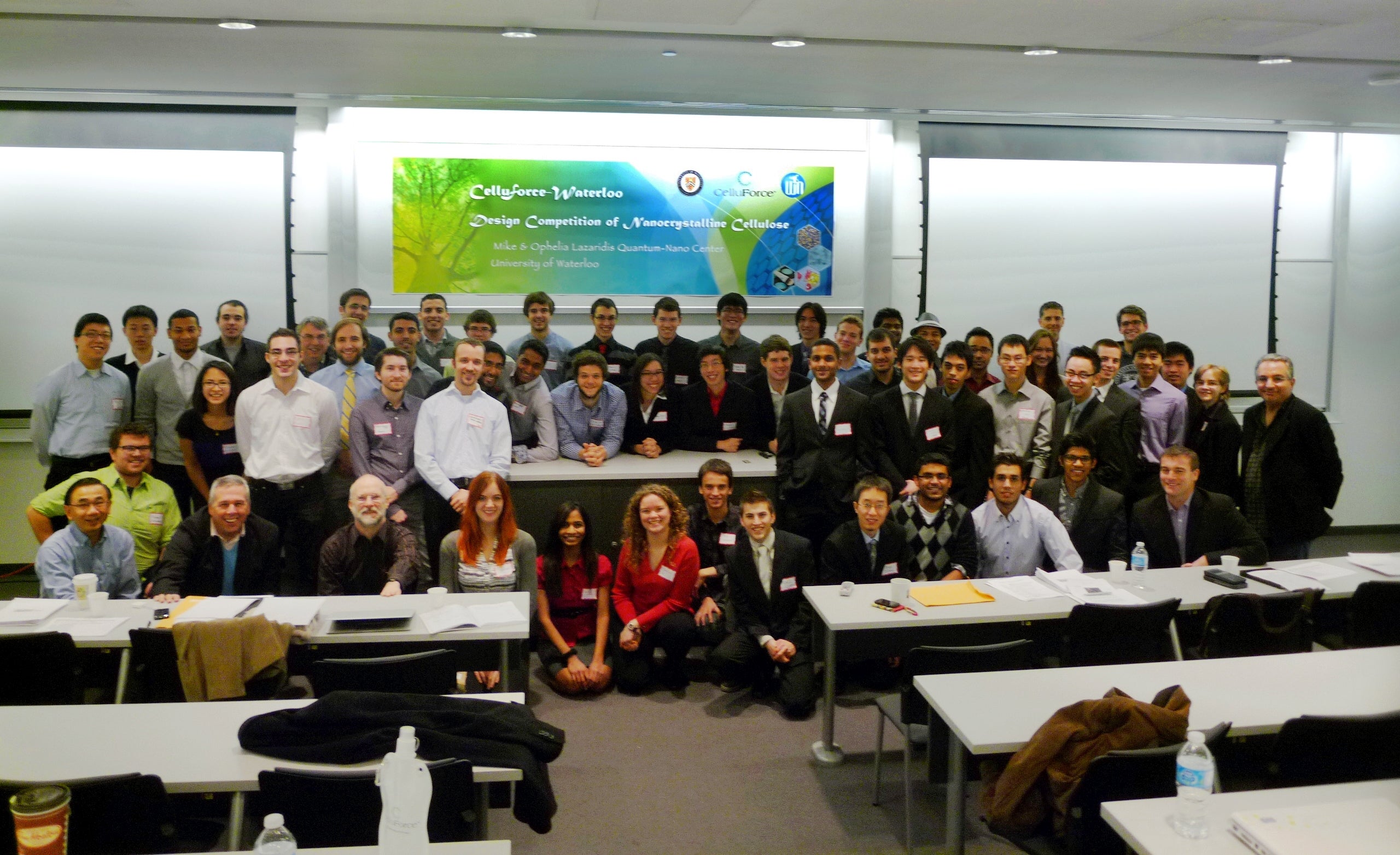
Held on December 1, 2012, the inaugural CelluForce-Waterloo Design Competition asked 20 teams of nanotechnology-engineering students to explore the potential of NCC in a variety of consumer and industrial applications. Groups started their engineering design in September 2012, and were given 15 minutes to present their ideas to a judging panel consisting of senior staff from event sponsor CelluForce, a Montreal-based world leader in NCC development.
Following the presentations, prizes were awarded to five teams:
-
First
Prize:
NCC
as
Structural
Reinforcements
for
Heart
Scaffolds
- Dushanth Seevaratnam, Dave Evans, Anjali Gopal, Stuart Linley
-
Second
Prize:
NCC
Reinforced
Paper
for
Speaker
Design
- Timothy Stork, Tyler Davidson-Hall, Kevin Joseph, Alexander Baran-Harper
-
Third
Prize:
NCC-Graphene
Composite
for
Novel
Nail
Polish
Applications
- Madelaine Liddy, Farzana Yusufali, Leo Duchene, David Wesley Olsen
-
Joint
Fourth
Prize:
Template
Synthesis
of
TiO2
Using
NCC
and
PEO
for
Environmental
Applications
- Cristina Belbeck, Nolan Lassaline, Abbas Abdel Wahab, Daniel Chelladurai
-
Joint
Fourth
Prize:
CellulARC-
NCC
as
anti-reflection
coating
for
solar
cells
- Chun Yuen Kwok, Won Kyu Sun, Joshua Cantin, Shirley Ma
The competition was organized by Dr. Michael Tam, a chemical-engineering professor and member of the Waterloo Institute for Nanotechnology. Dr. Tam and Dr. Chris Backhouse, Director of Nanotechnology Engineering, hope that this competition will inspire students to see and pursue the opportunities that arise from collaborative partnerships at the intersection of academia and industry.
“This was an exciting opportunity for students to show their ideas and talents to a corporate audience, and to better understand where their careers might take them. At the same time, we’re demonstrating what our program can do in terms of producing graduates with the skills necessary to have immediate and fundamental impact on both research and manufacturing processes,” said Dr. Backhouse.
Technology for large-scale production of NCC has been developed by FPInnovations, and a demonstration plant was built and commissioned in January 2012. Located in Windsor, Quebec, this plant is the first large-scale NCC production facility in the world. Funding for the competition was provided by CelluForce, a joint venture of Domtar Corporation and FPInnovations.
“CelluForce is proud to be a partner with the University of Waterloo in this competition. I was quite impressed with the quality and variety of innovative ideas that were presented at the event. The innovative solutions developed by the students not only benefit our industry, but Canada as a whole. The research definitely has the potential to transform the future of fibre,’’ said Jean Moreau, President and CEO at CelluForce.
CelluForce will continue to work closely with Waterloo researchers to develop NCC-based solutions that enable the development of new products, while transforming the performance of existing ones.

About the University of Waterloo
In just half a century, the University of Waterloo, located at the heart of Canada's technology hub, has become one of Canada's leading comprehensive universities with 35,000 full- and part-time students in undergraduate and graduate programs. Waterloo, as home to the world's largest post-secondary co-operative education program, embraces its connections to the world and encourages enterprising partnerships in learning, research and discovery. In the next decade, the university is committed to building a better future for Canada and the world by championing innovation and collaboration to create solutions relevant to the needs of today and tomorrow. For more information about Waterloo, visit uwaterloo.ca.
About CelluForce
CelluForce Inc. is the world leader in the commercial development of NanoCrystalline Cellulose (NCC), also referred to as Cellulose Nanocrystals (CNC). The company is a joint venture of Domtar Corporation and FPInnovations. CelluForce manufactures NCC/CNC in the world’s first demonstration plant of its kind, located in Windsor, Québec, develops new applications for NCC/CNC, markets and sells it. The company currently has a workforce of 40 employees and its head office is in Montreal. www.celluforce.com
Media Contacts:
Russell
Wong
Manager,
Marketing
and
Communications
Faculty
of
Engineering
University
of
Waterloo
519.888.4567
x38618
rpwong@uwaterloo.ca
Elpi
Klapas
CelluForce
514.871.4793
eklapas@webershandwick.com